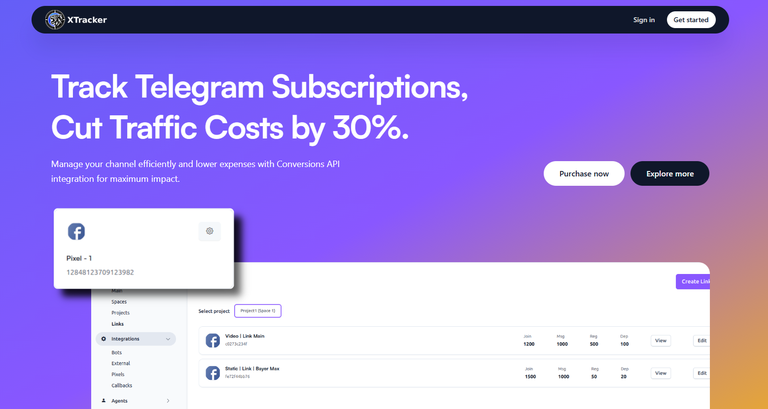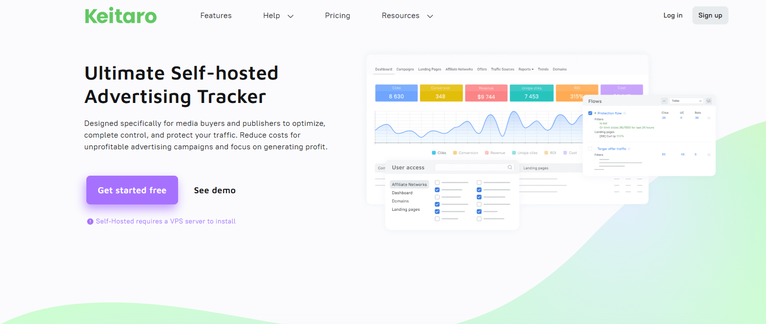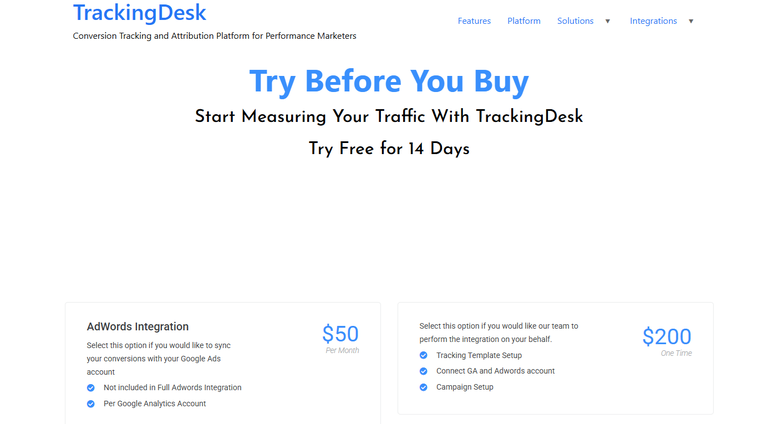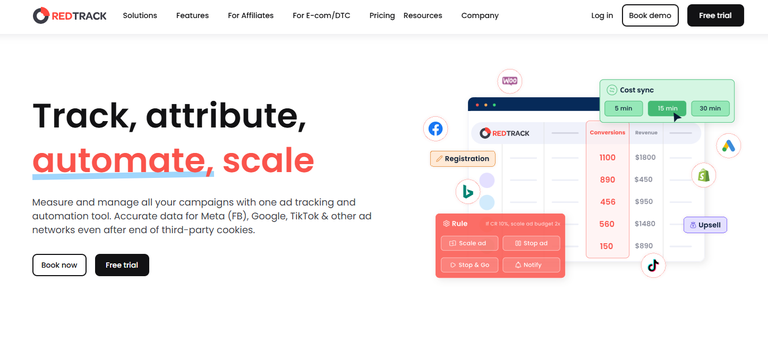What Is a Traffic Arbitrage Tracker?
A tracker for CPA marketing is a web analytics tool designed to help affiliate marketers analyze, manage, and optimize advertising campaigns. Its primary purpose is to provide detailed insights into traffic, conversions, and the performance of various sources. This enables users to maximize their ROI (Return on Investment).
Key Features of a Tracker:
- Traffic Data Collection.
- Postbacks and Affiliate Integration.
- Campaign Optimization.
- Analytics and Reporting.
- Anti-Fraud Measures.
- Customization.
- Automation.
Without a tracker, it’s difficult to determine which traffic sources are profitable and which ones are simply draining the budget. This tool is essential for affiliate marketers. It enables data-driven decisions, eliminates underperforming sources, enhances ad creatives, and helps select the best offers.
Top 5 Best Traffic Arbitrage Trackers for 2025
1. Xtracker
XTracker – a new and ambitious tool that’s rapidly gaining popularity due to its user-friendly interface. It is primarily designed for working with strategy-based traffic on Telegram and Facebook (strategy-based traffic is traffic generated through specific promotional strategies or step-based approaches).
Advantages:
- Comprehensive Lead Tracking – Follow the entire lead journey, from clicking on a Facebook ad and subscribing to a Telegram channel to visiting the advertiser’s page, sending a message on platforms like Telegram, and even making a deposit.
- Extensive Integrations – Includes all essential tools like Conversions API, Chat2desk, Facebook Pixel, and compatibility with general-purpose trackers such as Keitaro, ensuring seamless campaign management.
- Statistical Grouping – Allows grouping statistics based on specific parameters for deeper and more actionable insights.
- Detailed Reporting Metrics – Provides all the key metrics required to generate highly detailed and accurate reports.
- Real-Time Reporting – Supports real-time reports, even for individual media buyers.
Limitations:
- Relatively New Tool – As a young platform, it occasionally encounters minor bugs, but regular updates help resolve these issues quickly.
2. Keitaro
Keitaro – a popular general-purpose tracker widely used by affiliate marketers, especially in Eastern Europe and the CIS region.
Advantages:
- Flexible Flow Configuration.
- Traffic Distribution – Advanced traffic distribution features using a wide range of filters, such as GEO, mobile carrier, browser, and device.
- Bot Protection – Built-in bot database and real-time detection tools to protect landing pages from fraudulent or non-human traffic.
- VPS Installation.
Limitations:
- Limited Features in Basic Plans – Some advanced functionalities are restricted to higher-tier plans.
- Updates can sometimes cause unexpected problems.
- Dependence on Local Trackers – Requires integration with niche-specific trackers (e.g., XTracker) for certain use cases.
3. TrackingDesk
TrackingDesk – a conversion tracking tool tailored for those who primarily work with traffic sources like native ads and push notifications.
Advantages:
- Supports Multiple Traffic Sources – Compatible with almost all popular traffic sources, including PPC, social media, native ads, and push notifications.
- Free Trial.
Limitations:
- Complex to Use – The platform’s steep learning curve, due to its advanced features, may be challenging for beginners.
- Above-Average Pricing.
4. RedTrack
RedTrack – a cloud-based tracker designed to monitor and optimize performance from traffic sources like Facebook, Google Ads, and ad networks. It tracks clicks, conversions, user visits, and other key metrics to provide actionable insights and improve campaign ROI.
Advantages:
- User-Friendly Interface.
- Real-Time Reporting.
- Ideal for Affiliate Programs.
Limitations:
- Less Flexible Flow Settings.
- Above-Average Pricing for Small Teams.
5. Jusl
Jusl is not a traditional tracker; it’s a specialized service for creating deep links and micro-landing pages. Its built-in web analytics capabilities, such as traffic tracking and basic conversion metrics, make it a budget-friendly alternative to traditional trackers.
Advantages:
- Free or Affordable Plans – Offers a free tier, with paid plans starting at very low prices, making it ideal for small teams and individual marketers.
- Supports Any Traffic and Source.
- Pixel Integration – Allows integration with Facebook Pixel, VK Pixel, TikTok Pixel, and more for advanced analytics.
- Deep Links and Micro-Landing Pages – Enables the creation of deep links and micro-landing pages for enhanced user engagement.
Limitations:
- Limited Analytics – Lacks advanced reporting and detailed performance metrics commonly found in traditional trackers.
- Language Restriction – Setup are currently available only in Russian, which may limit accessibility for international users.
How to Choose the Right Tracker?
Key Factors to Consider When Choosing a Tracker:
- Budget – Ensure the tracker’s cost aligns with your business scale. For smaller operations, budget-friendly options like Jusl, which provide basic analytics at low prices, may be more suitable.
- Traffic Type – Decide whether the tracker is optimized for web or mobile traffic. Some tools specialize in one over the other, which can significantly impact your campaign’s effectiveness.
- Functionality – Determine if you need advanced integrations, such as Conversions API, Facebook Pixel, or multi-channel tracking, or just basic features for simpler campaigns.
- Data Processing Speed – This is crucial for handling large volumes of traffic efficiently. Slow processing speeds can delay decision-making and hinder campaign performance.
- Traffic Source Compatibility – Some trackers are better suited for specific sources, such as native ads or push notifications, while others, like XTracker, are specialized for Telegram and Facebook traffic.
Conclusion
In 2025, trackers remain an indispensable tool for traffic arbitrage, offering insights into campaign performance and enabling data-driven decisions. Each option in this list has its strengths, catering to specific needs such as affordability, advanced analytics, or compatibility with specific traffic sources.
Beginners will benefit from tools that emphasize simplicity and affordability, like Jusl, while experienced marketers may prefer advanced options such as XTracker for greater flexibility and functionality.
Choosing the right tracker is the first step toward successfully managing traffic and achieving long-term campaign success. Investing in analytical tools helps maximize ROI, optimize ad spend, and improve campaign efficiency for greater efficiency.
By Nailya Yeruslanova




